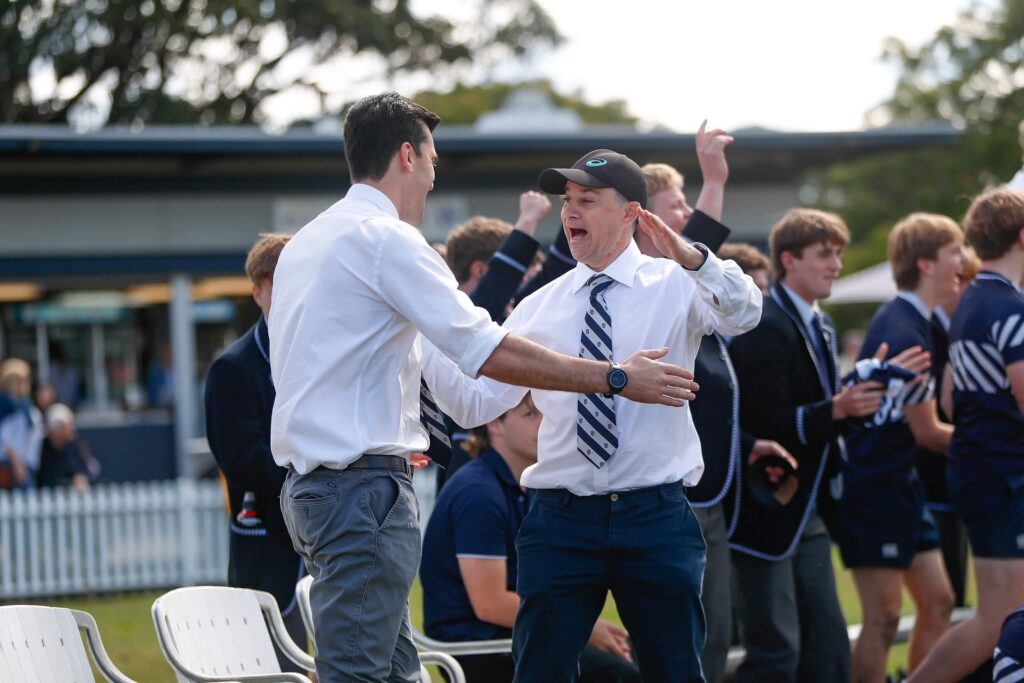Message from the Headmaster
‘Whatever you do, work at it with all your heart, as working for the Lord…’
Colossians 3:23
Dear Students, Parents and Carers
The Culture of Shore
The well-known management guru, the late Peter Drucker, is famous for one of his sayings: “culture eats strategy for breakfast”. What he means is that no amount of strategising can be effective in practice if it is not supported by the culture of the organisation. Culture is bedrock. In a school, its presence or absence is very noticeable.
In the last two weeks, Shore’s culture, in the form of many of its components, has been on display. It has been a spectacular fortnight for the School. The huge crowd of boys, supplemented by a similarly large crowd of Old Boys, was present in support of our First XV Rugby. The scenes of joy and exhilaration when, in winning the game, Shore was at the very least joint Premiers in GPS Rugby Firsts, was simply extraordinary. This was prefaced by hundreds of boys in the stand, united in their support for the School, interlocking arms and chanting and swaying. There were similar scenes last Saturday at Scots, where our boys secured the trophy as sole Premiers for the first time since 1969, i.e. 55 years ago.
Our Thirds Rugby also won the Premiership in a thriller of a match last Saturday. Their margin was just two points and the courage and desperation they exhibited in defending against the opposition in front of their try line showed character in a marvellous light.
Shore culture was again on show in the magnificent Gala Concert at the Sydney Town Hall, attended by our entire Senior School. The music was superb and the affirmation of our musicians by the rest of the Senior School was enthusiastic and complimentary. Many visitors remarked on the splendid behaviour of the boys. It was very healthy indeed that a number of the musicians are also outstanding sportsmen, actively involved in our programmes.
Our Football Firsts did not have the result they were seeking. In their final game for the Premiership, they hit the post four times and the crossbar twice and, in an effort to win the game in the dying moments by pushing their players forward, they went down 2-1, conceding a goal very late in the match. The gracious and dignified manner in which they accepted defeat, congratulated and paid respect to their opponents also spoke very well of the boys themselves and their ability to carry themselves well under duress. Adversity builds resilience and reveals a depth of character. It was particularly pleasing to see the number of Football boys who were in the crowd to watch the Rugby as well as the number of Rugby boys who were in the crowd to watch the Football over the last two weeks.
A strong culture gives boys a sense of purpose greater than themselves. It helps them establish an identity, in relation to others. It builds team, whether team be players or spectators or both, in turn. It takes them out of the sometimes virulent false world of social media into real life interactions. The evidence continues to mount that all these factors are very good for boys.
The base level of a strong culture is in everyday interactions, including and especially in the classroom, comprising a school in which boys of a wide range of interests and capacities feel a powerful sense of belonging. This cannot be artificially created, for instance by berating boys about their need to be proud of their school (which is usually spectacularly ineffective). It must come from within, in the sense of being organic and being “from the ground up”. The everyday interactions are not on show in the manner in which Sport and Performing Arts can be, but are the essential sinews of a strong school. We do know from last year’s superlative academic results that the classroom culture of excellence is strong. One current manifestation of that is the magnificent result in the Australian History Competition, where Patrick Huang (Year 7) and Rian Conners (Year 9) have come first in Australia at their level.
Aiming at excellence is in harmony with the Christian theology the School espouses, as in “Whatever you do, work at it with all your heart, as working for the Lord…” (Colossians 3:23). One aspect of this is a culture of high expectations.
My doctoral studies examined ethos and culture in schools. I am delighted by the culture I see at Shore. This is not to suggest it is perfect. All schools have areas which need some work. In Shore’s case, our various surveys do and will identify some of those areas. These do not negate the overall impression of strength of culture at Shore.
NAPLAN
Recent newspaper articles have been full of doom and gloom about our nation’s NAPLAN results (testing in Years 3, 5, 7 and 9). There has been a great deal of chest thumping by politicians and the commentariat, with sweeping claims that education is failing, based entirely on short tests of an hour and a half every second year, which have an ambiguous relationship with the actual curriculum and wherein the methodology is challengeable. Tests of Year 7 may do little more than reveal the general capabilities students have acquired in different schools, i.e. their primary schools.
It is sometimes said that NAPLAN is essentially a test of postcode in that those well-endowed, with resources and with parental buy-in to the value of education, by and large score well on NAPLAN. The design intent of NAPLAN was to provide teachers with diagnostic information on their students, not to be represented as a proxy of quality of education or school.
Shore’s NAPLAN results are absolutely outstanding. In the Senior School (Years 7 and 9), on all indicators of reading and numeracy, our students are in the strong or exceeding level of achievement from between 90% and 97%, with the exception of one indicator where 89.3% have achieved at that level. Moreover, the results are improving from year to year. It is a similar story in our Preparatory School.
My view is one which is not an “easy fix” or readily subjected to the “blame game” played so often by politicians and the media. It is, simply this: what NAPLAN reveals is an equity issue where disadvantaged communities, served by government schools, non-government systemic schools and independent schools, need more resources specifically targeted at lifting the capacity of those with multiple life disadvantages.
The Right to Disconnect
Legislation coming into effect across the country on 26 August cedes to employees the right to disconnect from work during their private lives. This is complex for teachers, given out of hours work with unit and lesson preparation, assessment and marking and co-curricular activities. Nevertheless, increasing awareness of psychosocial hazards gives employers the legal and moral obligation of caring well for their staff. One implication of this is that staff are not required to respond to emails, texts and phone messages at a time when they should be, and need to be, relaxing away from School. This is a matter of maintaining positive mental health, for which relaxation and recreation are essential. At Shore we will take a common sense approach to this, which will include respecting the right of staff to “switch off” at times of need to restore and recharge.
Dr John Collier
Headmaster































































